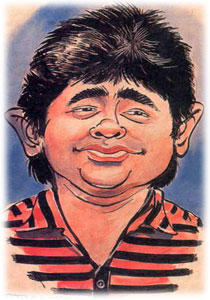AR Rahman speaks to us about his jugalbandi with wife Sehra, cricket,
and issues close to his heart.
AR Rahman walks in, straight from the airport, into a room full of
waiting journos and photographers, all in a frenzy to outdo the other
for an exclusive with this self-confessed recluse.
Anyone else might have blown his fuse for having the microphone
shoved under his nose for the umpteenth time, and being asked to
say 'something' for Team India. But not Rahman. He smiles politely,
and refuses to say anything that doesn't concern him and his work.
Doesn't he like cricket? "I do, but this is hardly the way to show
it," he says. So what does he feel for, so much that it
shows? "Causes. I want to remove poverty from India, and change the
immunity that we have developed towards it. I want to do a lot for
the specially challenged people. I want to change a lot of things.
But I don't talk about them either, for I'd like to do my bit and see
that making a change." Like his first English solo for the UN, Pray
For Me Brother? "Yes. This is my first humble step in making music
that is for the whole world as an audience. I was very nervous when
the song was released. I'm glad it's worked," says Rahman.
Amidst all this, no one notices a shy, quiet woman standing a few
paces away, waiting to catch Rahman's eye. His wife, Sehra. "We have
flown in straight from Glasgow. He must be very hungry," she says
softly.
Is it always like this? "Always. I get to see more of him at concerts
and TV than in reality," she smiles. Our photographer wants her to be
clicked, but she manages to evade him, and go and stand in a corner.
Back to Rahman. His recent compositions have been for three
contrasting films – Sivaji, Lord of the Rings, and now Akbar Jodha
(excluding Guru, that is). How does it feel to be composing in
different languages and time frames at the same time? "Terrifying,"
laughs Rahman.
"To wake up one morning and find yourself working on an epic, and a
commercial Tamil number together can be petrifying." Sometime ago,
he'd said that he could not be unapologetic while presenting his kind
of music to a Western audience.
Has that changed now? "To a large extent, yes. But if one's used to
eating burgers, one can't develop a taste for paav bhaaji overnight.
There has to be a bridge, and that's my music's flavour – 'bridgey',"
he says.
From a distance, Sehra tries to catch Rahman's eyes again. But he's
busy posing for our lensman. "Do I look sleepy? I've hardly slept
since a couple of days," he says. So how does he spend his leisure
time? "I try and spend time with my children." The couple has three
kids – Khatija, Rahima and Ameen – two daughters and a son. "My kids
love my music, thankfully.
My eldest daughter is already learning music," he says. At this
point, we request a picture with his wife. And finally, he looks for
her, their eyes meet, and he nods for her to join him. Your wife is
so shy, how does she handle all the fame, and recognition? "She
handles our home, I take care of the rest," he quips.

No comments:
Post a Comment